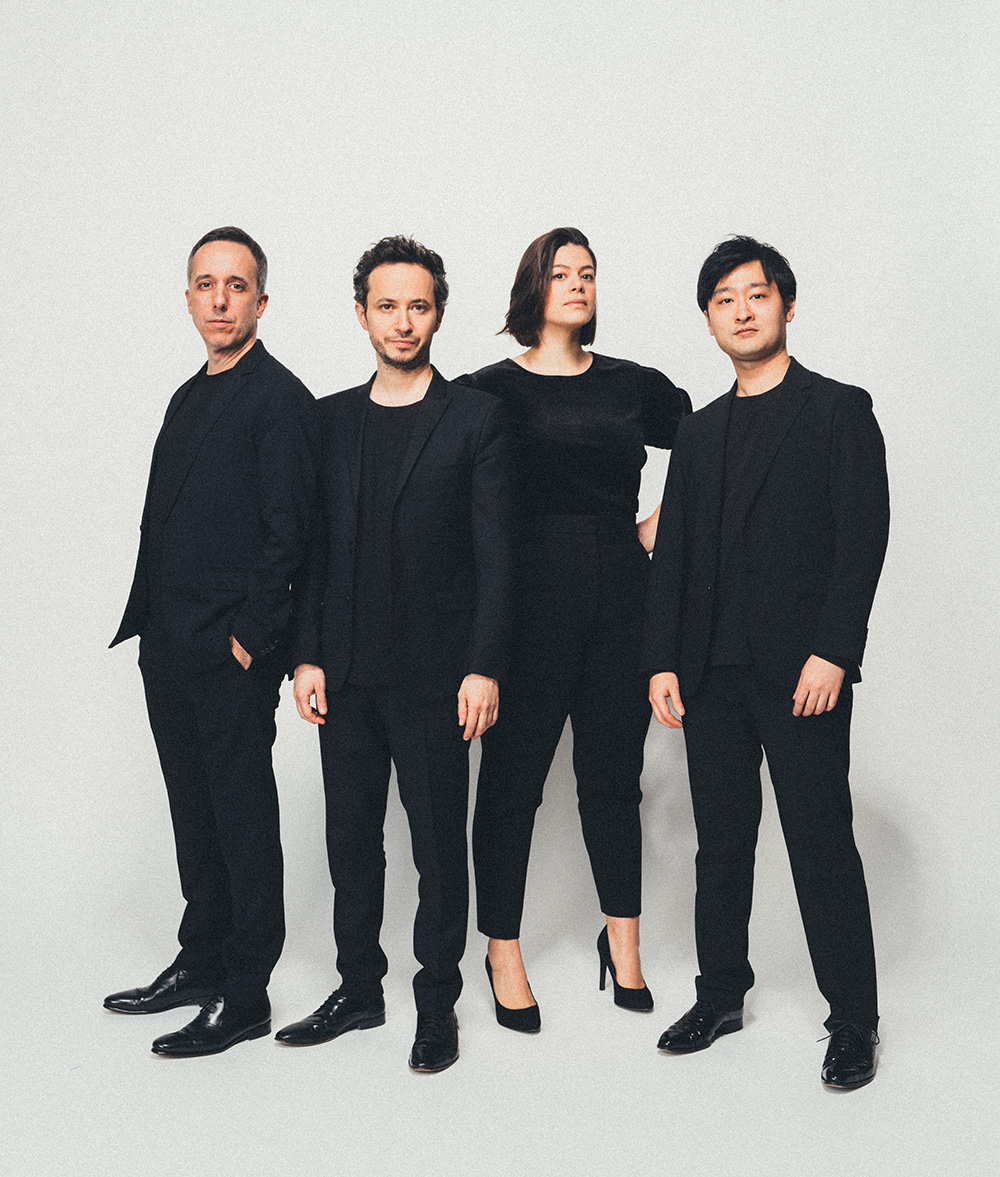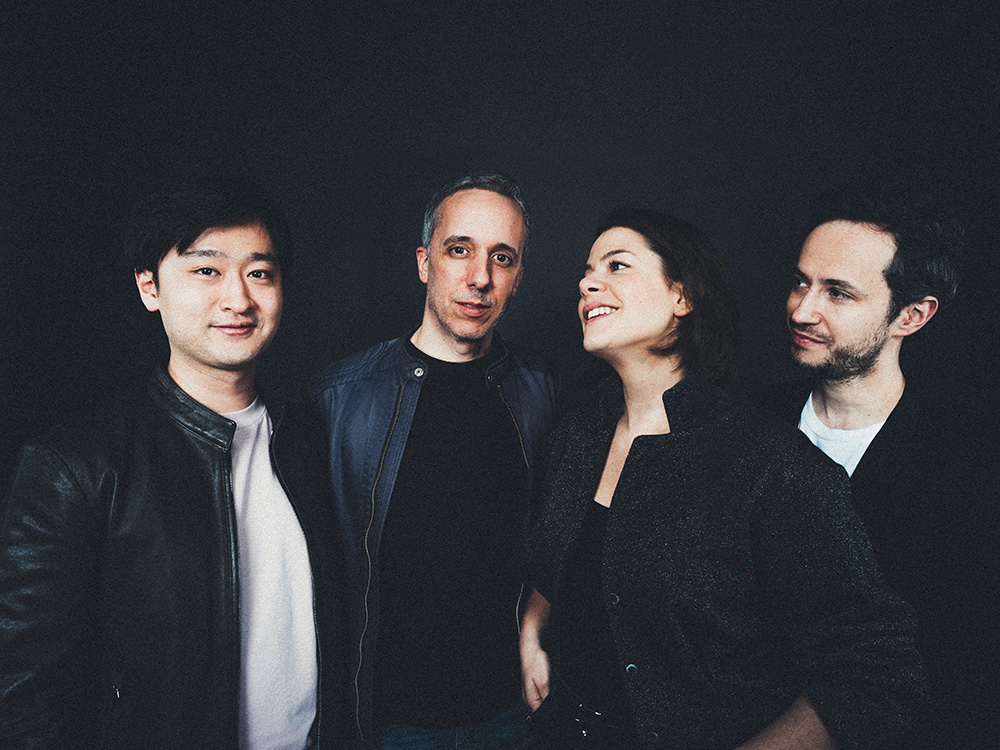Quatuor Ébène
For personal reasons, Marie Chilemme, the violist of Quatuor Ébène, will not be able to play this concert. We are fortunate to be able to welcome Marie Chilemme’s outstanding colleague Lawrence Power, who will be stepping in for her. However, this change in line-up also means a change in the programme: instead of Raphael Merlin’s Tetrhappy: String Quartet, Benjamin Britten’s Three Divertimenti for string quartet will be performed.
Lawrence Power is among the most talented violists of his generation. The artist, who currently holds the position of “Associate Artist” at London’s Wigmore Hall and is Artist in Residence at Southbank Centre in London this season, has performed with leading orchestras around the world, including the Boston Symphony Orchestra, the Chicago Symphony Orchestra, the Royal Concertgebouw Orchestra, and the Bavarian Radio Symphony Orchestra. In the field of chamber music, he has collaborated with artists such as Steven Isserlis, Nicholas Alstaedt, Simon Crawford-Phillips, Vilde Frang, Maxim Vengerov, and Joshua Bell.
Programme
- Ludwig van Beethoven: String Quartet in F major Op. 18/1
- Benjamin Britten: Three Divertimenti for string quartet
- Pyotr Ilyich Tchaikovsky: String Quartet No. 3 in E flat minor Op. 30
Performers
- Quatuor Ébène
- Pierre Colombet – violin
- Gabriel Le Magadure – violin
- Lawrence Power – viola
- Yuya Okamoto – cello
“The way fragrances seem to transition into sounds, echoes resonate from the depths of space,” wrote Süddeutsche Zeitung in 2023 after a concert given by the chamber ensemble Quatuor Ébène. The French ensemble has maintained its position among the world’s leading string quartets for more than two decades now. They are appreciated particularly for their interpretation of Classical and Romantic music, while they feel just at home in the world of jazz, contemporary music and crossover. The New York Times justifiably described them as “a string quartet that can easily morph into a jazz band”. Quatuor Ébène’s Prague Spring debut will present the first quartet opus by Ludwig van Beethoven (1770–1827), whose second movement is inspired by the closing scene from Shakespeare’s drama Romeo and Juliet. They will also perform the third string quartet by Peter Ilyich Tchaikovsky (1840–1893), whose world premiere in 1876 involved the participation of superb Czech violinist Jan Hřímalý, while the programme will be enriched by the playful Three Divertimentos by Benjamin Britten (1913–1976), first performed at London’s Wigmore Hall in 1936.
The dazzling international career of Quatuor Ébène dates back to the year 2004, when they won the coveted ARD competition in Munich. Over the subsequent twenty years they garnered other important awards: the Belmont Prize 2005, the Borletti-Buitoni Trust Award 2007 and, as the first ensemble in the history, the 2019 Frankfurt Music Prize. Highlights of their current season include a residency at Radio France and Vienna’s Konzerthaus, a tour of North and South America, and concerts at the Verbier festival in Switzerland, London’s Wigmore Hall, the Elbphilharmonie in Hamburg and the Théâtre des Champs-Elysées in Paris. We should also mention their collaboration with colleagues from the Belcea Quartet on tour in Asia where they will present a programme featuring octets by Felix Mendelssohn and George Enescu.

The ensemble received a series of awards for their recordings of Debussy, Ravel, Mozart and Schubert for the Erato label. In a truly remarkable achievement, Quatuor Ébène also recorded the complete set of sixteen Beethoven string quartets, which they performed and recorded to mark the 250th anniversary of the composer’s birth, and this on six different continents – in Vienna, Philadelphia, Tokyo, São Paulo, Melbourne, Nairobi and Paris. “In themselves, Beethoven’s quartets represent an odyssey, a round-the-world voyage,” the ensemble members declared. “Having relished the white-hot interpretative intensity and fantasy of these performances for several weeks now, I cannot imagine returning to old favourites,” wrote critic Jonah Pearl in a piece for The Classic Review. Quatuor Ébène released Mozart quintets with the Prague Spring’s Artist-in-Residence 2023, violist Antoine Tamestit, an album which won a Choc de Classica, a Diapason d’Or and was named Gramophone’s Recording of the Month. Artists who regularly collaborate with the ensemble include cellist Gautier Capuçon (Artist-in-Residence of the Prague Spring 2022), countertenor Philippe Jaroussky and baritone Matthias Goerne.
We should add a word about the instruments played by the individual members of the ensemble. Leader Pierre Colombet plays on a violin crafted in the workshops of Italian masters Antonio Stradivari (1717) and Matteo Goffriller (1736), second violin Gabriel Le Magadure has instruments created by Giuseppe Guarneri (1740 and 1743–1745), violist Marie Chilemme alternates violas by Stradivari (1734) and Marcellus Hollmayr (1625), and cellist Yuya Okamoto’s instrument originated in the workshop of Milanese master Giovanni Grancino (1682).








